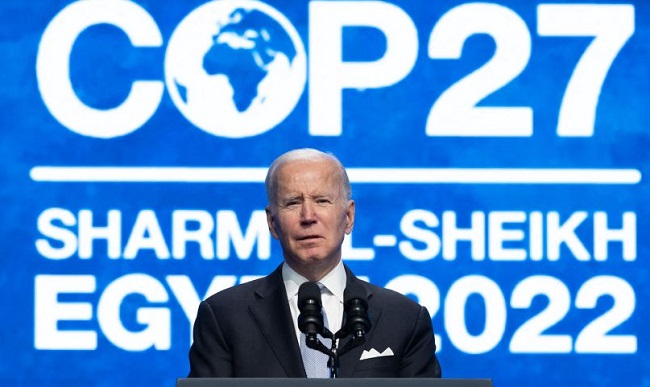
At the United Nations Climate Change Conference (COP27) in Sharm El Sheikh, Egypt, on Friday, President Joe Biden of the United States of America, announced over $150 million to accelerate the implementation of his Emergency Plan for Adaptation and Resilience (PREPARE) work across the Africa. This is in support of the “Adaptation in Africa” initiative he and Egypt’s President Abdel Fattah El-Sisi announced in June.
This funding, according to White House sources, includes US support for expanding access to early-warning systems for all of Africa; building the capacity of African decision-makers of today and tomorrow to accelerate adaptation across the continent for years to come; supporting locally-led efforts to adapt to climate impacts; expanding access to risk-based insurance for the most vulnerable; mobilising the private sector for adaptation and resilience; further supporting climate-smart food systems in Africa, and advancing climate security through Sahel-Climate Advocacy and peacebuilding with pastoralists.
Regarding better early-warning systems, President Biden announced new US support to accelerate these efforts, including a $13.6 million contribution to the Systematic Observations Financing Facility that will help fill weather, water, and climate observation gaps in Africa. The United States will also invest $15 million to support the co-development and deployment of early-warning systems in Africa, leveraging the U.S. National Oceanic and Atmospheric Administration’s (NOAA) long-standing relationships with national and regional weather services across Africa.
ALSO READ FROM NIGERIAN TRIBUNE
According to the International Federation of Red Cross and Red Crescent Societies, better early-warning systems can reduce the number of people who need emergency assistance by half by 2030.
In mobilising the private sector for adaptation and resilience, the US is contributing an additional $25 million to the African Union’s flagship Africa Adaptation Initiative (AAI), which is hosted by the Egyptian government, to launch the AAI Food Security Accelerator, which will dramatically speed- and scale-up private sector investments in climate resilient food security in Africa.
The US is also launching a ‘call to action’ to the private sector to tap into their ability to develop innovative adaptation solutions in ways that the public sector cannot, providing an additional $3.8 million to CRAFT TA Facility, and $2 million to launch an adaptation window of the Global Innovation Lab for Climate Finance to help develop new financial instruments and mechanisms to harness private investment in adaptation.
The US Sahel-Climate Advocacy and Peacebuilding with Pastoralists initiative aims to reduce the risk of farmer-herder climate change-related conflict in communities spanning the border of Niger and Benin by concurrently increasing herders’ access to political participation in local and national government and improving herders’ and farmers’ access to climate forecasts of rainfall, droughts, and other environmental factors.
President Biden said, “My friends, I came to the presidency determined to make transformational changes that are needed, that America needs to make, and we have to do for the rest of the world, to overcome decades of opposition and obstacles to progress on this issue alone” and “to reestablish the United States as a trustworthy and credible global leader on climate. As I stand here before you, we’ve taken enormous strides to achieve that.
“At this gathering, we must renew and raise our climate ambitions. The United States is acting. Everyone has to act. It’s a duty and responsibility of global leadership.”
This story was produced as part of the 2022 Climate Change Media Partnership, a journalism fellowship organized by Internews’ Earth Journalism Network and the Stanley Center for Peace and Security.
WATCH TOP VIDEOS FROM NIGERIAN TRIBUNE TV
- Let’s Talk About SELF-AWARENESS
- Is Your Confidence Mistaken for Pride? Let’s talk about it
- Is Etiquette About Perfection…Or Just Not Being Rude?
- Top Psychologist Reveal 3 Signs You’re Struggling With Imposter Syndrome
- Do You Pick Up Work-Related Calls at Midnight or Never? Let’s Talk About Boundaries






